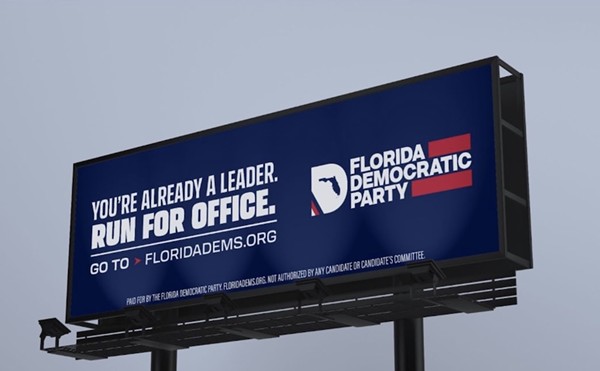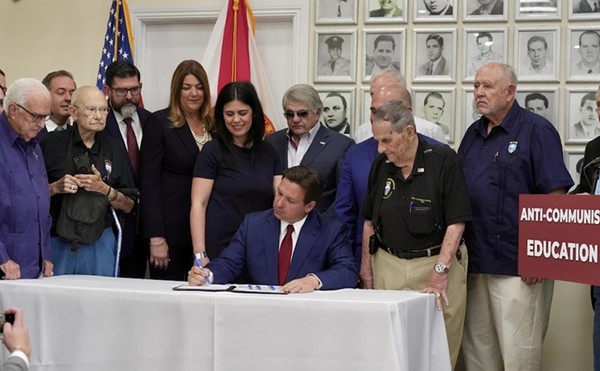On St. Valentine's Day, an amalgamation of religious groups calling itself the Florida Coalition to Protect Marriage announced its campaign to amend Florida's constitution to forever ban gay marriage. Spearheaded by the Longwood-based Liberty Counsel, the group, which has since renamed itself Florida4Marriage.org, is well on its way to gathering the necessary 611,000 signatures – mostly by hitting up churchgoers on Sundays – to earn the proposed amendment a spot on the November 2006 ballot.
If it gets there, it almost certainly will pass. A poll taken in 2004 by the St. Petersburg Times and the Miami Herald found that 65 percent of Florida voters opposed gay marriage. But first the Florida Supreme Court must give its stamp of approval, and that's where gay-rights activists are pinning their hopes. The American Civil Liberties Union of Florida and other groups have filed briefs asking the court to reject the proposed amendment because, they say, it is misleading and violates a Florida law that says constitutional amendments have to focus on a single subject.
The question before the court boils down to the definition of a single word: "substantial."
In the same poll in which 65 percent of Floridians opposed gay marriage, a smaller majority – 53 percent – said they support allowing same-sex couples to form civil unions. Although it doesn't mention the words "civil union," the Florida4Marriage.org's amendment would essentially outlaw them along with gay marriage, without voters even realizing it.
"They're trying to sneak in [a ban on] civil unions undercover," says Karen Doering, regional counsel for the National Center for Lesbian Rights.
The devil's in the details. As proposed, the constitutional amendment would read: "Inasmuch as marriage is the legal union of only one man and one woman as husband and wife, no other legal union that is treated as marriage or the substantial equivalent thereof shall be valid or recognized."
Voters would see similar language on their ballot summaries: "This amendment protects marriage as the legal union of only one man and one woman as husband and wife and provides that no other legal union that is treated as marriage or the substantial equivalent thereof shall be valid or recognized."
The key phrase is "substantial equivalent." In its filings with the Supreme Court, the Liberty Counsel says the amendment would ban both gay marriage and anything that mimics gay marriage, such as the civil union laws in Vermont and Connecticut. At the same time, the Liberty Counsel argues, the amendment wouldn't affect domestic partnership policies already in place in the cities of Gainesville, West Palm Beach, Key West and Miami Beach, and at several public universities.
According to the Liberty Counsel's brief, those partnership agreements aren't a "substantial equivalent" of marriage, and thus, they're OK. Essentially, if this amendment passes, the state can pass laws that give gay couples some of the protections married couples have, but not all of them. "Legal unions between unmarried persons that provide less than the panoply of rights, protections, benefits, obligations, responsibilities and duties afforded to married persons are not affected by the proposed amendment," the Liberty Counsel told the court in a brief.
The state's analysts aren't so sure. On Oct. 11, attorney general Charlie Crist submitted a statute-required Financial Impact Estimating Conference report to the Supreme Court that outlined the fiscal pros and cons of the amendment. Whatever monetary gains or losses occurred, the analysts said, would be minimal or indeterminate.
But they did agree with the ACLU that the effects could be far-reaching. Domestic partnership registries and domestic violence laws could be changed, the analysts said. So could health insurance benefits and bereavement leave, which some municipalities offer same-sex couples.
Those statements directly contradict the Liberty Counsel's argument that its amendment is narrowly focused.
From a financial perspective, the FIEC report states the biggest impact could come from litigation over the vagueness of the "substantial equivalent" phrase.
Gay-rights advocates think the Liberty Counsel is trying to sugarcoat a more aggressive agenda.
"They can argue whatever they want now," Doering says. "After, they can turn around and argue the exact opposite."
At what point does a domestic partnership law become too substantial?
"'Substantial equivalent' is anything they say is the substantial equivalent of marriage," Howard Simon, executive director of the ACLU of Florida, tells Orlando Weekly in an e-mail. "Beyond that, the courts will interpret this language into the future – neither the ACLU nor the Liberty Counsel will control how that will be interpreted."
Under the state's Defense of Marriage Act – passed in 1997 and authored by Liberty Counsel president Mat Staver – gay marriage is already illegal in Florida, and for that reason Gov. Jeb Bush called the ballot initiative premature. But conservatives have long feared state courts could find that unconstitutional. The amendment is a pre-emptive strike.
There could be more far-reaching consequences. Simon points out that in Michigan, the state's attorney general used similar language in a constitutional amendment to bar domestic health benefits for state employees. (A court disagreed, and the attorney general is now appealing.) And while the Liberty Counsel is saying now that the amendment wouldn't affect lesser forms of gay unions, the group argued the opposite in 2000.
That year, it backed a lawsuit in Gainesville that argued that, under the Defense of Marriage Act, it was illegal for the city to grant health benefits to domestic partners. By granting those benefits, the Liberty Counsel argued, Gainesville was treating same-sex couples like married couples. The Liberty Counsel lost.
The ACLU says the "substantial equivalent" phrase violates the single-subject rule because it knocks out civil unions along with gay marriage. The Liberty Counsel counters that the amendment has "one common purpose – the protection of marriage as the union of one man and one woman as husband and wife," and that slides it by the single-subject rule.
It also makes this claim: "By casting their ballot in favor of marriage as the union of one man and one woman, voters are not being asked to reject rights and protections for same-sex or unmarried couples. The proposed amendment presents no such Hobson's choice."
The ACLU counters, "If the proponents want to ask voters to approve both [a ban on gay marriage and a ban on civil unions] they are free to do so, but they have to do it in two separate proposed amendments, not one."
The ACLU has another, less complicated argument. Florida law says ballot summaries can't editorialize or inject emotion. The coalition's summary is almost identical to the proposed constitutional amendment (actually, the summary has more words than the amendment itself), but there is one difference: The summary states, "This amendment protects marriage as the legal union of only one man and one woman as husband and wife … [emphasis added]."
Again, the argument centers on a word – "protects." If something is to be protected, then it must be under attack. And in the context of this political debate, if marriage has to be protected, then that assumes that without the amendment, it may be destroyed. "It's designed to inflame passions," says Doering. "They're trying to influence the outcome of the vote."
Indeed, the proposed ballot title for the amendment is "Florida Marriage Protection Act." In its response to the court, the Liberty Counsel argued that "protects" is neutral.
There's no telling when the Supreme Court will rule. For the Liberty Counsel, however, time is of the essence. On Oct. 12, it asked the court to expedite oral arguments. Under a new constitutional amendment passed last year, all ballot initiatives must have their 611,000 signatures collected by Feb. 1 to make the November ballot. If the court rules against the coalition soon, there is still time to rewrite the amendment, collect signatures and try again. If the court delays before ruling against the amendment, it's game over – at least for 2006.
[email protected]



















